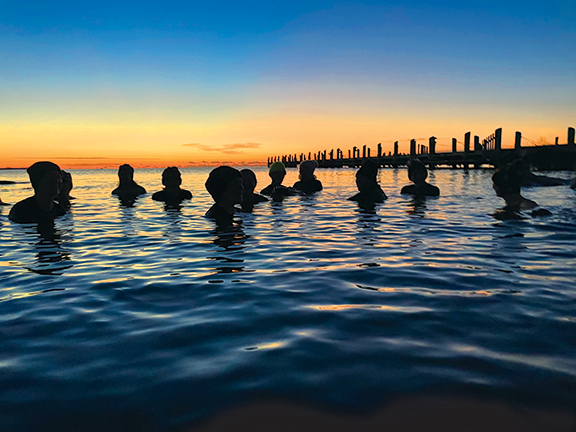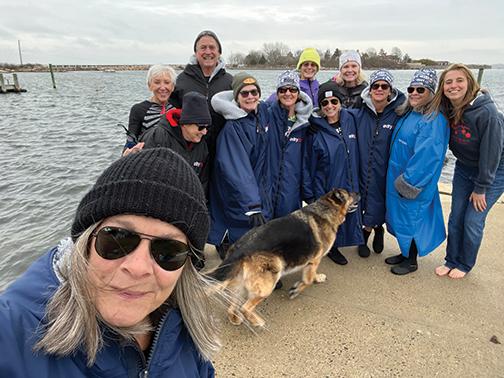
When I pulled off the exit towards Mystic Seaport, Connecticut, I came around the corner of a narrow, tree-lined road and saw the ocean stretching wide and limitless behind the bay. Whitecaps threatened the gentle waves, a gray sky hugged the shoreline. My little car was warm, a hovel of safety protecting me from the howling ocean wind. Moments like these remind me of my soft fragility. How, like a small animal, I crave a warm hovel to protect me from the harsh environment. It was unfathomable how I was going to collect enough gall, in the five minutes I had left of my drive, to jump in the ocean. As I pulled into the parking lot of our meeting spot, sucking down the last dregs of warm coffee, I noticed an athletic, older woman in a pink puffy vest, sporting dark sunglasses and leaning on the hood of an SUV. It was as if she was a member of the secret service. Sighing to leave my little pocket of warmth, I walked towards the door of our meeting spot, only to hear the agent call my name. Turning around, we hugged, and she smiled at me behind the wall of her sunglasses. “Get in, I’ll drive.”
Kathleen Bellicchi drives with purpose, skillfully handling the tight backroads of an island community in Connecticut with a nonchalance that comes with experience. As we cruise by the stark waterfront houses and gulls circling the morning waves, Bellicchi talks about her past as a cold-water dipper. “I used to go for a five-mile run on New Year’s Day and then jump in the water. I remember sometimes going ‘God, this feels so great,’ then other times going, ‘Wow, this is so stupid.’” She elaborates on her experience in Alaska, sailing off a boat on the southeast side of British Columbia. She and the crew used to polar plunge every single week near a glacier; her goal was to swim at least 10 strokes.
As someone who once lived in Alaska, and frequented glaciers, I could not comprehend the urge to get into that water. My muse on this dilemma was cut short as we pulled into the end of a small residential neighborhood, where a group of robe-donning women flocked like colorful birds around a dock. Bellicchi wasted no time. She hopped out of the warm car, grabed her things, and fluttered towards the group – it was like a bird returning to its nest.
There were about 10 to 12 older women, welcoming me. I was given booties and gloves to protect my body from the cold water, as well as a big dry robe to keep warm. One woman laughingly referred to her post-dip nakedness under the robe as her “naughty ride home.”
The dock reached out like an arm grasping for the other side of the bay, wind blew my hair around as I attempted to stuff it under a hat, one of the women gave me. The ocean was cold, menacing, gray. On the opposite side of the dock, there was a boat launch where the woman stood before galloping into the water. Everyone began to strip. While laughing and talking one woman, yelled, “SHIT! I forgot the fireball shots!” Everyone let out an exclamation of disdain, proclaiming “Next time!” and “Dammit!” I questioned if they did shots every time they plunged and Betsie, the organizer of the group, smiled “Only if Jacqui is here.” These women were not simply participating in an event together and then going home to their separate lives; they were sisters (quite literally – Jacqui and Betsie are twins).

Suddenly, like walking into a forest where sleeping birds lay, came an explosion as the women plunged into the water. I stood, feeling humble, slightly stupid – I was stuck, hobbling, pulling one leg out of my sweatpants. The joyful women called words of encouragement as I stripped down to my bathing suit and neared the water, taking a deep breath and walking in.
The cold was instantaneous, a thousand pins piercing my legs and knees. Bellicchi, swapping her sunglasses for swim goggles, swam freely around the other women. A big cheer sliced the air as I stepped further into the water, Bellicchi urged me to “go below the shoulders, it gets warmer.” Another woman kindly told me she would go in whenever I was ready, that I was doing great. As we absurdly flocked in the water, I looked around at these women, full of smiles, full of stories, and it was as clear as the icy water we jumped in why they did this every morning.
Jeanne, a dipper, sat against the wall of the boat launch, donning a black tight jacket and a blue cap with fish on it. She did not look cold, as I shivered out of my bathing suit under the dry robe. “When I come into the water, there is no time or no context. It is just me, and the water, in the moment; I am nobody’s daughter, I am nobody’s wife, nobody’s mother, but I am somebody’s friend.” Her husband passed away from ALS last June, and meeting this group of women has been a lifeline for her.
Amy, with robin blue eyes that stand in stark contrast to the slate sky, tells me from the water that her reason for dipping is to ease the side effects of long COVID. “I had a headache once so bad, I couldn’t lift my head off the pillow. I thought ‘maybe I shouldn’t go dipping,’ but then I thought ‘I couldn’t really feel worse.’ So, I went in, and after a few minutes I felt great. Originally, I was just going to stay in bed all day.”
The medical community is hesitant to recommend cold water plunging as a medicinal solution, yet it offers so many health benefits. As we walk back to the car, Betsie reassures me that the benefits are exponential, from boosting metabolism to acting as a cure for depression. I gratefully hop back in Bellicchi’s car, and we speed back to Betsie’s for a hot shower. After being welcomed into her house and cozying up after a hot shower, we all enjoy a cup of tea at her kitchen table. The pace of life here seems as comfortable, and slow, as the gentle, inky river, flowing outside her kitchen windows.
Betsie started doing the cold plunges on January 1, 2021, after a heated pickleball match with her neighbor Anthony, who originally brought the idea of cold water dipping to life. “He bought a huge garbage can and filled it with water in his garage, in the winter he breaks the ice in the morning and plunges in. We all thought he was NUTS, I mean, we really thought he was crazy. But the more he talked about it, the overall wellness of it, I was intrigued.” So, when she was sweaty after the game, and lamented how badly she would like to take a swim, Anthony inquisitively questioned, “Want to?”
For a while, it was just them consistently jumping in the water every morning, staying in for no more than three minutes. Yet, people started joining one by one, Betsie referred to it as “the painting of the fence in Tom Sawyer, it really took on a life of its own.”
Now, with 2024 right around the corner, they have a large text thread with about 25 women that dip every day, and collectively call themselves “Big Chill,” a name created by Betsie’s daughter, Hannah. How did this masochistic activity garner so many participants? Because of the sense of community it fosters. Betsie refers to the Big Chill as “chatters with a side of swimming. It is a very safe feeling group. There is no judgment, nobody cares how long you’re in, if you’re just coming to chat, you can just sit on the wall, nobody cares if you stay in for three seconds or 12 minutes.”
The act of undergoing something traumatic like jumping in freezing water, fashions a sense of comradery and an unbreakable bond. Something one woman, after dipping, referred to as “a feeling of resilience. It’s so kickass, and we go about our day with a feeling that we are kickass.”
As I bundle up to leave, Bestie and Bellicchi share their secret for a happy life. A moment passes in thought, Bellicchi absently plays with her teabag. Betsie reaches her hand across the table to grasp Bellichi’s, they both smile at each other, at me, “It’s community.”



